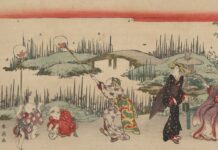Photo by : Berta Nelly Arboleda
( Note: This is a chapter from the author’s novella CLOSER and comes immediately after the chapter titled A Thousand Irises, published in Modern Literature earlier – https://www.modernliterature.org/2018/01/07/thousand-irises-george-angel/ )
Things go and things stay. Beten was going. Now he was going toward was. From his doorway five steps, Soeur holding Beten’s hand, Ad looking out the window. Ad was tense and tired of nighness. A first voice begins softly, Beten wants to say something. A second voice, Soeur’s, receives it and cradles it. Butterfly-handed, she brushed the hair away from his face, as it faded.
One week earlier, through the dark window, in a room full of shadow, Ad mostly still, Beten circling, talking, coughing, circling. I was standing, five and nine steps away, under the wide eaves where I could watch them and hear them. “It doesn’t seem to be particularly good news to find out one is a monster, does it?” Beten said.
The morning we awoke among the irises, we heard the air crack, like fireworks, like a threat from children, and it was time to walk, to begin crossing the valley. Smoke rose like a stain from a nearby hill, but it was already something left behind, erasing itself.
Like puddles between the hills, small valleys and here and there, a village. One such, like many, and we were here. Only a dappling of wild carnations on a hillside let us know to stop. And then we were here, and Beten was embracing Ad and Soeur.
In the room they talked softly, but it was mostly Beten. “Now every hour is a lulling,” he said. “Cocoons are especially vulnerable to the hungry. No one will praise your attempts at nonbecoming, and you need to take care to not appear thirstless. It was too showy, a problem to deal with as me became I.”
No one wanted to stay in this village because there had been an outbreak of ignisplaga. The wailing of those who burned inside could be heard near the sick house, worse when they took to shaking and convulsing. Tumors gone to ulcers, one of them would appear, mostly naked, feet webbed, resisting continuing to become, reddened. They looked up at the statue of their killer to save them. It had lost an arm in a storm. And still Soeur sniffed among them, sat by their cots. She would want us to stay here.
When the wheezing in Beten’s breathing stopped, he was still. Gone, but far to walk to get where he is going, finding the rhythm of it in the dark now, the rhythm of not here, like the rhythm of advancing, in threes: upward stroke, downward stroke, enter and cross the t. Beten is like water sliding over things.
“Sometimes knowing what animal someone is matters, even when that someone is ignorant of the fact,” Beten said. They both glanced briefly at the window I was outside of. “Thank Eliphio. He has lifted a great burden from you. The Barrus have always been our allies, even without knowing it.”
What others say is also something to carry. “Knowing is the least comfort of all, since it is precisely knowing that makes you a monster,” Beten said. “If I hadn’t lived all this myself, I would never be as blunt as I am being, now, here, with you. Being more than one thing at a time is soon a name, like the habit of breathing. You are an indirect light. Simply put: the horror of being absolutely sure, bone-certain that, while you may change state or substance, while you may dream or awaken, you will continue living forever in the light of all your actions. You and I are processes, we are belief walking around that eats itself up, while the animals are signposts blowing across a plain, the contents of a wave. Circumstance no longer shelters us, and we are all, all of us poraile.”
Fifty steps from that window I turned, and they were there, tied to each other, beating upon themselves. Leave their tangles of needs, desires, and appetites everywhere for someone to lug. Now and again the appearance of fanatics, but passing, not staying here. Still, huddled like petals overlapping, a pain flower. So in love with fire. How many steps to go still, to fall apart?
Strangers wrapped him in a sheet. Letting the time walk on ahead, because Soeur would not be parted from him until he was in the ground. Ad tagged along behind, walking more inside than outside.Beten said, “If I leave my hands somewhere, they soon die. Age like this. This old. Like the bark branches black up, elbowing, on the excessive blush of sheet’s blossoming. So it’s carry them, push them about or well into numbness always before I know it.” Soeur crossed quickly, as if she didn’t see me.
Soeur was unable to sleep. It might have been the soup with dumplings we ate. Ad would not touch the roast swan. A large moth found its way into our room late, bright owl’s eyes on its wings. Darkness unhinged it and it was frantic in the air. Soeur lit candle and talked to it. She sang to it. The shell whisper nestled in the morning shell/that filled the leaf shells and made them dew shells/brimming over russet, firing over the shell/ of the sky’s inner streaks like the held rustling of birds/ heard behind green, within wet shadows still.
The morning began with the sound of birds shaking the frost from their wings, and soon came day, thick and heavy, like a sorrow-flowered shrub, the clouds its white blooms. Shadows from the branches outside veined over Soeur where she nestled on the sheet.
How long had we been here?
“I have grown spindly, with a hundred joints afflicted,” Beten said. “I am gone to root sleep now. Let me say this before the door opens. He that will come to kill you is a blind spot within we.” Ad tilted his face toward the floor and Beten continued on, “Remember: to bless means to wound. You can have this place of hiding if you want it.” To reach the drawer with the key in it, Beten had to cross a carpet of yellow trumpets. “The one that comes to kill you will have been raised in a hive on the sweet jelly of certainty. He will be sure he gives off light. Everything that feels and grows in the world will turn away from him.”
A woman charging a few coins for a glance at a chicken with fur. It could have been the sickness in the air, but the village was a hive, and its buzzing was full of things from sleep. Things sometimes went out of proportion. A group of people waiting under a flower for the icy rain to stop. Three passed-out drunks using the fin of a bloated fish as a blanket. There was a man sitting in the mud, claiming to have been blinded by sparrows, rubbing dung into his eyes. A pregnant woman gnawed on a brick.
Stationary Ad receiving, Beten describing a circle around him, unburdening. “I wouldn’t give a plucked hen for anyone in this village,” he said. Irae brought the teapot in. Its steam and color dulled the air.
“We are all sitting in an immense mouth, trying to break to pieces our elaborate little toys of desire,” he began again. “From this perichareia to philistion and philemon, a joy that rots followed by laughing yourself to death.” He shook his head and laughed, “No. Not exactly a benediction.”
The old woman, Irae, who had been his cook and maid, bent over the mound of dirt that was left of him. She placed a wild carnation there. She stood and looked at us, her face was bitter. “This is no life,” she said, “we live like pigs.”
Then Ad was gone, from one moment to the next, turned his back and was something thought, made up, as if he had been no more than clouds and smoke.
Beten said, toward the end, “Can you smell the tar makers at work, trying to stick the world together again? Fat pine in a big kettle for axle ends, broken horns and hoofs, to seal a cut, a cough, or even an old voice.”
We were going to carry this then, the old house, the village. Soeur could move here freely. Would carry without moving. We would dig in.
The last time we saw Ad, Soeur asked him, “What do you know about this village anyway?
Ad said, “The flames they carry around inside them is the least of it. Who was eaten? Who was in a caldron? Who married a rat that has the eyes and nose of his deceased wife? Who must drink perpetually from a barrel? Who had lizards covering her back? Who was hammered on an anvil? Too many, too close. See? Who sparked for wrath? Who was shoed like a horse and ridden? Wells and ovens receiving. Who grew a jug handle? Who dragged herself over the rocks and suffered her extremities to be bitten by slithering things? Who was run through by an arrow’s flight? Who glowed, and who farted mocking laughter? Who was lost and tied to a duck? Who had to put herself back together again, just so she could again be taken apart? Who saw all this to music?”
Beten had dug into the dirt. Ad had dissolved into the air. We would not leave because we would never finish arriving.
About the author:
The son of Colombian parents, George Mario Angel Quintero was born in 1964 in San Francisco, California, where he spent his first thirty years. He studied literature at the University of California and was later awarded a Wallace Stegner Fellowship in Fiction from Stanford University. He has published fiction, poetry, and essays in English as George Angel in literary magazines and the chapbook Globo (1996), and received the Nilon Award from Fiction Collective 2 for his book The Fifth Season (1996). He has since published a book of new and selected poems written in English, On the Voice (2016). Since 1995, he has lived in Medellin, Colombia, where, under the name Mario Angel Quintero, he has published six Spanish poetry collections, as well as three books of plays in Spanish. His visual art has been exhibited and published and he has also illustrated books. Since 2003, he has worked as director and playwright of the theatre company Párpado Teatro, and is a founding member of the musical groups Underflavour and Sell the Elephant.
















